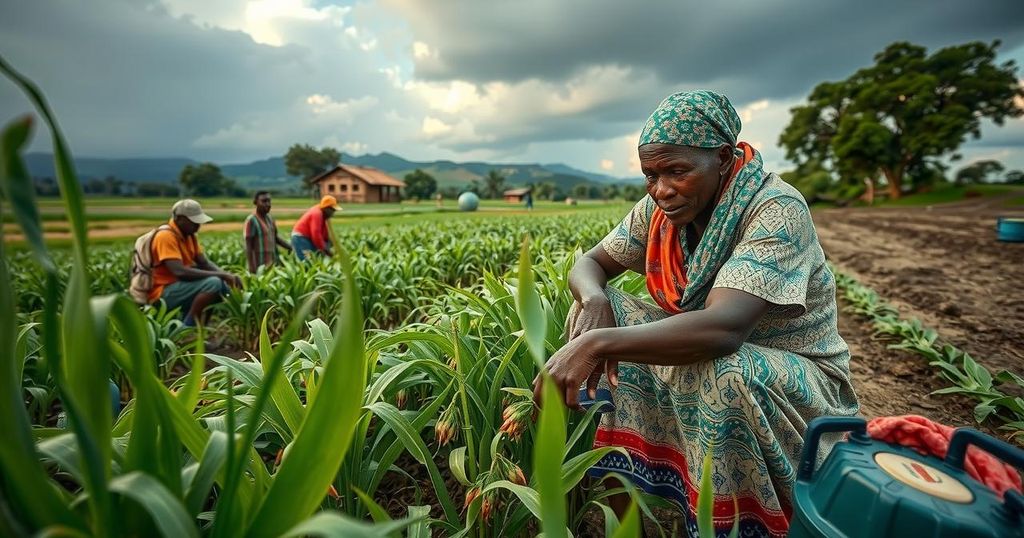This article focuses on Awad Usman, a refugee farmer from Sudan living in South Sudan, who struggles with farming amidst climate change challenges such as flooding. UNHCR and its partners are providing vital support to refugee farmers through training, infrastructure improvements, and financial assistance, enabling them to adapt and sustain their livelihoods in increasingly difficult conditions.
Awad Usman, a 37-year-old refugee from Sudan, grows sesame and sorghum in Maban, South Sudan. Each day, he ties a small metal casing with a prayer to his arm, believing in its power to renew hope as he faces the challenges of farming amid climate change. After fleeing conflict over a decade ago, he has established a semblance of stability, yet his livelihood is increasingly threatened by extreme weather events, including flooding. Awad recalls the devastation of the last flood, which destroyed his crops and left him struggling to provide for his family. UNHCR, the UN Refugee Agency, recognizes that refugees like Awad are particularly vulnerable to the impacts of climate change, which exacerbates existing issues stemming from prolonged conflict. In South Sudan, rainfall has decreased significantly while the incidence of flooding has increased, resulting in humanitarian crises that displace countless individuals. Many, including Awad, live in a delicate balance, relying on their agriculture to survive. In collaboration with local communities, UNHCR has initiated various projects to enhance the resilience of refugee farmers. These efforts include land negotiations, providing financial assistance for seeds and equipment, and training on diverse farming practices. By introducing more profitable crop varieties, such as sesame, farmers can better secure their income and food supplies. Furthermore, substantial infrastructure improvements, such as constructing dykes and bridges, aim to protect farmland from flooding and maintain access to essential services. Awad has significantly benefited from these initiatives, successfully harvesting his crops ahead of the rainy season due to better practices and protective measures. He describes the joy of working alongside his family in the fields, singing and nurturing their crops. Despite the challenges, Awad’s resilience and the support from UNHCR lay the foundation for a self-sufficient future, illustrating the importance of adaptive strategies in agriculture as climate change continues to pose a threat. In conclusion, the story of Awad Usman highlights the intricate relationship between conflict, climate change, and refugee livelihoods. Through targeted interventions and community support, efforts are underway to equip vulnerable populations with the tools needed to adapt and thrive, ensuring food security and improved living conditions in the face of adversity.
The article discusses the challenges faced by refugee farmers in South Sudan, particularly in adapting to the adverse effects of climate change such as flooding and drought. UNHCR, alongside local organizations, is actively working to provide support and resources to these communities, as they often lack the means to effectively cope with extreme weather disruptions. The situation is compounded by the historical context of conflict in the region, making the integration of climate resilience into agricultural practices crucial for survival and self-sufficiency.
The ongoing initiatives led by UNHCR and its partners present a proactive approach to addressing the dual challenges of climate change and refugee livelihoods. By equipping refugee farmers with necessary training, resources, and infrastructure improvements, UNHCR is fostering a sustainable pathway for agricultural success in South Sudan. Awad Usman’s story exemplifies resilience amidst adversity and underscores the critical need for continued support for vulnerable populations facing the looming threats of climate change.
Original Source: www.unhcr.org






